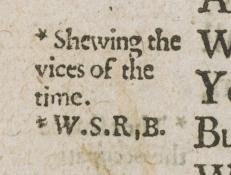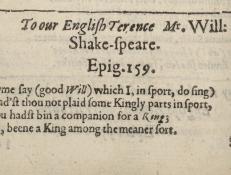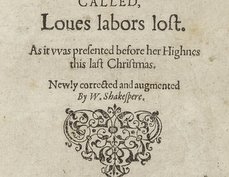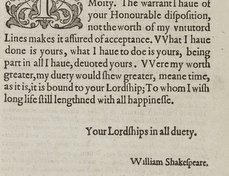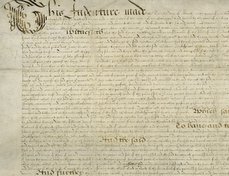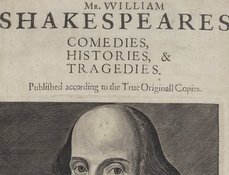Terms of Use
Images that are under Folger copyright are licensed under a Creative Commons Attribution-ShareAlike 4.0 International License. This allows you to use our images without additional permission provided that you cite the Folger Shakespeare Library as the source and you license anything you create using the images under the same or equivalent license. For more information, including permissions beyond the scope of this license, see Permissions. The Folger waives permission fees for non-commercial publication by registered non-profits, including university presses, regardless of the license they use. For images copyrighted by an entity other than the Folger, please contact the copyright holder for permission information.
Copy-specific information
Creator: John Davies of Hereford
Title: Microcosmos. The discovery of the little world, with the government thereof. By Iohn Davies.
Date: At Oxford : Printed by Ioseph Barnes, and are to bee solde in Fleetestreete at the signe of the Turkes head by Iohn Barnes, 1603.
Repository: Folger Shakespeare Library, Washington, DC, USA
Call number and opening: STC 6333 copy 2, title page & sig. 2F4r (p. 215)
View online bibliographic record
Alan H. Nelso, "Microcosmos: John Davies of Hereford alludes to Shakespeare," Shakespeare Documented, https://doi.org/10.37078/234.
Folger Shakespeare Library, STC 6333 copy 2. See Shakespeare Documented, https://doi.org/10.37078/234.
John Davies of Hereford was one of the most prolific poets of his age. He was born about 1565 and died in 1618, making him William Shakespeare’s nearly exact contemporary. Though his poems were published (perhaps self-published) in some dozen large volumes, only one reached a second edition. With literary ambitions that far out-stripped his talent, he maintained a successful career as a writing-master. At Oxford Davies instructed scholars in the art of writing, though he was not a university scholar himself. He then removed to London, where he mingled with gifted poets whom he addresses in great profusion in The Scourge of Folly (1611). The ODNB lists the most significant as “the king [James I], Francis Bacon, Sir John Davies [a namesake], Fulke Greville, Thomas Campion, Samuel Daniel, Ben Jonson, William Shakespeare, John Fletcher, John Marston, Joseph Hall, Herbert of Cherbury, Francis Beaumont, Michael Drayton, and George Chapman.”
Microcosmos was first published in 1603, with follow-up issues in 1605 and 1611. It is a typically rambling verse essay which distributes praise and blame over a wide range of topics, including “players,” page 215, beginning on line 15:
Players, I loue yee, and your Qualitie,
As ye are Men, that pass time not abus’d:
And some I love for painting, poesie, W.S. R.B.
And say fell Fortune cannot be excus’d,
That hath for better vses you refus’d:
Wit, Courage, good shape, good partes, and all good,
As long as all these goods are no worse vs’d,
And though the stage doth staine pure gentle bloud,
Yet generous yee are in minde and moode.
In our transcription we have placed “W.S.R.B.” against the third line of the stanza. As may be seen in the photograph, these letters are actually signaled by a superscripted “c” against the word “some” in line 17, referencing a side-note printed closer to line 10.
Davies praises both players and their profession. In addition, he loves some for their painting and for poetry. The referenced “W.S. R.B.” almost certainly alludes to William Shakespeare and Richard Burbage, who practiced poetry and painting respectively, and indeed would practice these skills cooperatively in the Rutland impresa of March 30, 1613.
Davies expresses the opinion that although acting would “stain” persons of “gentle” blood (l. 22), common players not only do not risk the stain, but are capable of being “generous” in mind and in thought. Here Davies puns on Latin generosus, meaning both “gentleman” and morally elevated.
Davies references William Shakespeare, more or less distinctly, in two other publications: The Civile Wars of Death and Fortune (1609), and The Scourge of Folly (1611). Scourge of Folly includes Shakespeare’s name in full. Though the “W.S.” discussed here may not constitute a fully convincing reference by itself, its association here with “R.B.” and the repetition of “W.S. “ and “R.B.” in The Civile Wars constitute a credible allusion to William Shakespeare and Richard Burbage.
Written by Alan H. Nelson
Sources
P. J. Finkelpearl, “Davies, John (1564/5–1618),” Oxford Dictionary of National Biography (Oxford University Press, 2004) Accessed 16 May 2016 <oxforddnb.com/view/article/7244>
F.J. Furnivall, C.M. Ingleby, and L. Toulmin Smith, comps. The Shakspere Allusion-Book: a Collection of Allusions to Shakspere from 1591 to 1700. Edited by John Munro. (London: Oxford University Press, 1932): 1:126.
Last updated June 8, 2020



